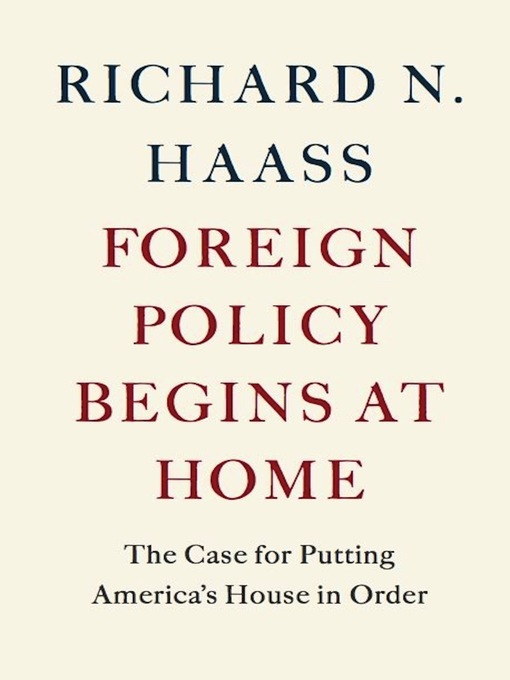
Foreign Policy Begins at Home
The Case for Putting America's House in Order
کتاب های مرتبط
- اطلاعات
- نقد و بررسی
- دیدگاه کاربران
نقد و بررسی

May 20, 2013
Haass, Council on Foreign Relations President, has a simple message for America's policymakers: we have seen the enemy and it is us. Or, to quote directly: "The biggest threat to America's security and prosperity comes not from abroad but from within." Haass devotes the first half of this short book de-scribing how, in post-Cold War years, the world changed but the U.S. "position relative to others was unavoidably diminishing." To continue to act as if the status quo works is foolish, he concludes. He notes real, emerging external threats, but the key message is thus: the U.S., "while in a unique position to do some valuable things in the world, cannot do everything." Haass methodically lays out possible actions, from "humanitarianism" to "restoration", and corresponding arguments for each alternatives' success or failure. Although he is prone to making sweeping statements, ("the country's engineers grade U.S. infrastructureâ¦somewhere between a C at best and a D at worst"), his sources are trust-worthy. However, while Haass lists steps toward positive change for the U.S., his solutions center on "politics" and require "real leadership," leading one to think that he is looking for solutions in an arena that has provided few superheroes.

March 15, 2013
Council on Foreign Relations president Haass (War of Necessity, War of Choice: A Memoir of Two Iraq Wars, 2010, etc.) makes the case for "a new approach to domestic and foreign policy." The author states from the outset that the United States "must restore the domestic foundations of its power" if it is to continue to act successfully abroad. He argues for a rebalancing of issues that bridge domestic and foreign policy. The U.S. could then operate under more realistic premises, less ready to deploy military force "in large-scale, military-dominated experiments." Haass points out that the wars in Iraq and Afghanistan account for "15 percent of the debt accumulated since 2001" and that "imperial overstretch is, at most, a contributing cause of America's economic predicament." Since no power, or combination of powers, represents an existential threat, and great power conflict is unlikely for the foreseeable future, the author concludes that there is an opportunity to restore the sources of foreign power through rebuilding domestically: Restore solvency, encourage domestic energy production and the growth of trade and investment, rebuild domestic infrastructure, and focus on education in citizenship. Haass also notes that there would be further consequences for foreign policy as resources were increased to meet internal as opposed to international challenges--e.g., the current focus on the Middle East and large-scale land wars would need to be reassessed. The author advocates caution in pursuing doctrinal goals, such as the promotion of democracy, arguing that outcomes should not be artificially predefined or constrained by any single path or sequence of events. He hopes "abstractions and optimism do not overwhelm assessments of national interests and realities." Lessons learned from the recent past and presented thoughtfully as a viable new course.
COPYRIGHT(2013) Kirkus Reviews, ALL RIGHTS RESERVED.

April 1, 2013
This book can be seen as a follow-up to earlier works by the prolific Haass (president, Council on Foreign Relations; The Opportunity: America's Moment To Alter History's Course). The major development here is in Haass's shift of focus to domestic economic policy as the foundation of U.S. power. He notes the current national budget debates, which, he says, result from systemic changes in the U.S. economy and in international geoeconomic realities that impact our national security. The book is divided into two sections. The first sets the stage through a discussion of the major aspects of the international realities of the post-Cold War world. Here Haass also examines the post-9/11 world and the challenges to international cooperation after the onset of the global financial crisis of 2008. The second half focuses on a more discriminating and pragmatic foreign policy that is supported by a more disciplined domestic policy. Given his clear discussion and a new look at the opportunity for renewed international leadership, Haass can be labeled as neither a defeatist nor an isolationist. VERDICT This informative, well-written book is a necessary addition to any collection providing either experts or citizens with new and rational discussion of America's place in the world today.--Marcus Kieltyka, Central Washington Univ. Lib., Ellensburg
Copyright 2013 Library Journal, LLC Used with permission.

April 1, 2013
The greatest threat to national security is not a rising China or Islamic terrorists or North Korea's nuclear power. Instead, our greatest security threat lies in divisive politics and fiscal deficits brought on by costly wars that have resulted in underinvestment in human capital. Haass, president of the Council on Foreign Relations with foreign policy experience in four administrations, is not arguing for isolationism but for a sharper evaluation of why we go to war and what it costs us. He begins with a historical perspective on U.S. foreign policy as it has evolved from the Cold War to U.S. primacy to a new era of rising powers and emerging nations. But his primary focus is on domestic policythe need to reverse the decline of U.S. competitiveness, stabilize the middle class, and strengthen the economy. Haass follows up his The Reluctant Sheriff (1997) and The Opportunity (2006) to make his case that a focus on economics, energy, education, immigration, and other domestic issues, including fractious politics, can strengthen the nation from within and bolster its ability to deal with any external threats.(Reprinted with permission of Booklist, copyright 2013, American Library Association.)

























دیدگاه کاربران